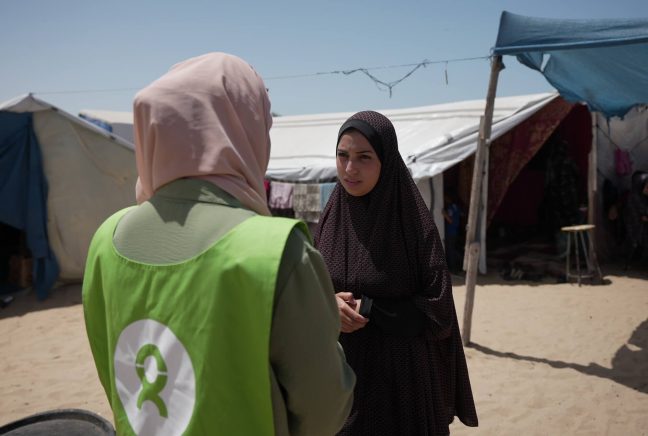As the bombardment of Gaza rages on and food shortages worsen, Oxfam supporters around the world have helped reach 490,118 people with lifesaving aid. Here’s what that looks like.
The already catastrophic situation in Gaza has continued to deteriorate over the past few months. Israel’s bombardment from the air, land and sea has killed nearly 40,000 people, with many more injured or missing. The onslaught has destroyed more than half of Gaza’s homes and water systems, and nearly 2 million people are internally displaced.
The destruction of crops, livestock, greenhouses, bakeries and wells has worsened existing food shortages. Now, 96% of people in Gaza face high levels of food insecurity, which means they do not have regular access to the food needed to stay healthy. Markets are near-empty, and what is available is extremely expensive. This is contributing to severe hunger, malnutrition, starvation-related death and other health complications.
What Oxfam is doing
Humanitarian workers in Gaza are currently working under extremely dangerous conditions to do their jobs. On top of the ongoing bombardment, humanitarian workers are navigating unexploded ordinances, destroyed roads, looting, closed access points and approval delays from Israel that are needed for passage.
Despite this, Oxfam has been working to provide essential aid to those most at risk while campaigning for a permanent ceasefire. The Confederation has reached 490,118 people with lifesaving aid. This has included:
- Food parcels, including hot meals and vegetable baskets
- Desalination units, water bladders, taps to supply clean water
- Family hygiene kits including soap and cleaning products
- Dignity kits including medical supplies
- Cash assistance for non-food items
- Psychological first aid training for young people
- Emergency care training for midwives
- Mother and baby kits to support new mothers
- Assistive devices such as crutches or batteries for hearing aids for people with disabilities
- Bedding such as mattresses, pillows and sleeping mats
- Winterisation kits including blankets and warm clothes
- Commodes (portable toilets)
Oxfam’s supporters around the world have also helped fund repairs to water networks, installation of latrines and handwashing stations, daily solid waste collection and information on protection against gender-based violence.
“A deeply emotional experience”
Wassem Mushtaha is Oxfam’s Saving Lives Program Manager in Gaza. At the end of June, he returned to Gaza for the first time since the start of the war began. Here’s what he had to say:
“The area was filled with destruction. Buildings were destroyed … Everywhere, you can see sewage.
Poverty was evident with many people struggling to find food and clean water. I went to the market. We didn’t find any type of food — Only some canned foods with high prices.
In spite of all the challenges that they faced during this massive war, the people in Gaza are still strong. They are creating innovative ideas to overcome the situation in Gaza, to protect themselves and their children.
This positive impression that we captured from people in Gaza created new hope among all of us, that we would return back to Gaza and Gaza would be reconstructed and life would return back soon, after having the ceasefire.”
A ceasefire remains the only way to end this suffering and allow Wassem and the people of Gaza to rebuild. Oxfam Australia, alongside our international affiliates, will continue to do all we can to address this humanitarian catastrophe while we demand a permanent ceasefire.

